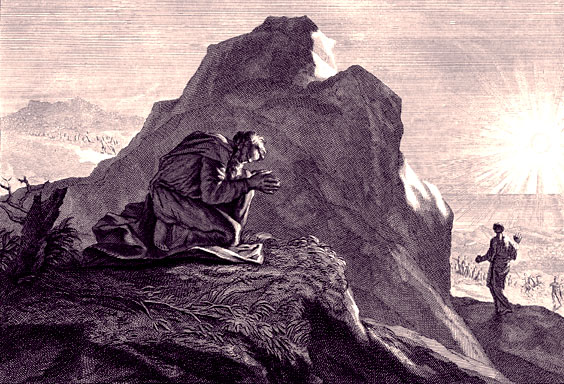
The Effective, Fervent Prayer of Elijah
The effective, fervent prayer of a righteous man avails much. (James 5:16)
JAMES is talking primarily about prayer in the context of healing. "The prayer of faith will save the sick, and the Lord will raise him up," he says, "And if he has committed sins, he will be forgiven" (James 5:15). He expands on that latter point in the first half of verse 16, "Confess your trespasses to one another, and pray for one another, that you may be healed." Then he ties it all together with this statement about the power of prayer: "The effective, fervent prayer of a righteous man avails much."
This extends far beyond the question of healing and forgiveness — all the way to the moving of mountains. The "effective, fervent prayer" of verse 16 is the same as the "prayer of faith" in verse 15. It corresponds to the kind of prayer and faith Jesus talked about in Mark 11:23-24:
Whoever says to this mountain, "Be removed and be cast into the sea," and does not doubt in his heart, but believes that those things he says will be done, he will have whatever he says. Therefore I say to you, whatever things you ask when you pray, believe that you receive them, and you will have them.
This kind of prayer belongs to whoever will exercise it, for Jesus said, "whoever says to this mountain." It is for all of God's people. James uses the prophet Elijah to demonstrate this.
Elijah was a man with a nature like ours, and he prayed earnestly that it would not rain, and it did not rain on the land for three years and six months. And he prayed again, and the heaven gave rain, and the earth produced its fruit. (James 5:17-18)
Elijah was simply a human being, just like us — one of the people of God. He was no different and no greater than anyone in the church today. Jesus said, "Assuredly, I say to you, among those born of women there has not risen one greater than John the Baptist; but he who is least in the kingdom of God is greater than he" (Matthew 11:11). Now follow this equation carefully. Up to that time, there was no one who was greater than John the Baptist, not even Elijah. But anyone who is in the kingdom of God (including you and me) is greater than he. Therefore, however great Elijah was, according to Jesus, we are greater. This means that we can pray in the same way Elijah prayed and expect to see the same kind of results.
What does "effective, fervent prayer" look like, and what are its marks? For the answer to that, James refers us to the story of Elijah and his rain prayers (1 Kings 17:1 and 18:41-46). It began when Elijah confronted Ahab, a king of Israel who had forsaken the Lord and was following after Baal, the god worshiped by the surrounding nations. Dominion over the weather was supposedly part of Baal's province, so Elijah, taking careful aim at that, gave Ahab this message: "As the LORD God of Israel lives, before whom I stand, there shall not be dew nor rain these years, except at my word" (1 Kings 17:1).
The story then passes on to some other exploits, including Elijah's defeat of the prophets of Baal at Mt. Carmel about three and a half years later. With those prophets destroyed, and the worship of Baal thoroughly discredited, Elijah could now bring the drought to an end. So he went to Ahab and said, "Go up, eat and drink; for there is the sound of abundance of rain."
Then Elijah went up to Mt. Carmel where he bowed down on the ground, putting his face between his knees. "Go up now, look toward the sea," he told his servant. The servant went up, looked around, came back and said, "I see nothing." This happened seven times. Finally, on the seventh time, the servant came back and said, "There is a cloud, as small as a man's hand, rising out of the sea!" So Elijah told him, "Go up, say to Ahab, 'Prepare your chariot, and go down before the rain stops you.'" Then the sky grew dark with clouds and wind, and a heavy rain came (1 Kings 18:41-46).
The FIRST thing we learn from Elijah's prayer is that he listened to the Lord. It was not his own idea to shut off the rain. Elijah was the prophet of the God of Israel, "before whom I stand." He heard the voice of the Lord, then he simply prayed and spoke what he heard.
How often we launch into prayer expressing our own thoughts, and our own will, instead of stopping to listen for what the Lord would have us pray. Then we wonder why our prayers don't get answered. But here is a bit of wisdom that applies as much to praying as to anything else:
Trust in the LORD with all your heart, and lean not on your own understanding. In all your ways acknowledge Him, and He shall direct your path. (Proverbs 3:5-6)
If we would take the time to discover what the will of God is, we would find our prayers much more effective. The apostle John said, "This is the confidence that we have in Him, that if we ask anything according to His will, He hears us" (1 John 5:14). It is not hard to know what God's will is, for He has given it to us in His Word. There are two questions we should ask when we pray: "Lord, what should I pray for?" and "Lord, how should I pray for it?" If we will just ask, God will show us.
The SECOND thing we learn is that Elijah persisted in prayer. James said he "prayed earnestly." The Greek construction of that phrase literally says that Elijah "prayed prayer!" This follows an idiom of Hebrew thinking that was used for emphasis. It means that Elijah was very serious about his task. He did not just rattle off a prayer and then move on to the next thing.
On Mt. Carmel, he put his head between his knees. This was not a position of despair ("Oh, my goodness, what am I going to do now?"), but a shutting out of distractions. His physical senses were useless in this situation, and could have become a hindrance. So he shut them out and focused in prayer until faith rose up within him and he knew in his spirit that his prayer was answered. In other words, he kept praying until God told him to quit.
THIRD, Elijah prayed in faith. He did not wait until he saw if the rain would hold back before he went to confront Ahab. And he did not wait for thunderclouds to form before he told Ahab that the rains were returning. He walked by faith, not by sight. He did not believe his prayer was answered because he saw it, he saw it because he believed it.
Heaven has no regard for prayers of unbelief. The Bible says that "without faith, it is impossible to please Him, for he who comes to God must believe that He is, and that He is a rewarder of those who diligently seek Him." (Hebrews 11:6). Prayers of doubt have no guarantee. "Ask in faith, with no doubting, for he who doubts is like a wave of the sea driven and tossed by the wind. For let not that man suppose that he will receive anything from the Lord." (James 1:6-7). But prayers of faith always get God's attention, and they carry this promise: "Whatever things you ask when you pray, believe that you receive them, and you will have them."
FOURTH, Elijah's actions and words agreed with his prayer. They were not at odds with it. He did not pray fervently, only to get up and say, "Well, I don't know, we'll just have to wait and see." He did not hint around with Ahab about what might or might not happen. He was bold in his faith and did not equivocate. He told Ahab when it would not rain and again when it would. In fact, he let Ahab know that it was going to rain even before he prayed for it because he knew he was going to bring it about through his prayer.
Not only was faith present in his prayers, but it was also present in his words. There is a relationship between what we pray and what we say. Jesus said, "Whoever says to this mountain, 'Be removed and be cast into the sea,' and does not doubt in his heart, but believes that those things he says will be done, he will have whatever he says." Notice that what we say and what we believe are to line up with each other. They are both important to the process of prayer.
FIFTH, Elijah prayed in expectation, watching for the answer. As he prayed on Mt. Carmel, he sent his servant out to the edge overlooking the sea. This was not to find out if his prayer had been answered — he was already confident of that — but to see if the answer had shown up yet.
Jesus said that whatever things we ask for in prayer, "believe that you receive them, and you will have them." This means that when we pray in faith, we receive the answer at that time, for Jesus would not tell us to believe this if it were not so. The answer is given to us in the spiritual realm, and though it may not immediately manifest in the natural realm, as we continue in prayer and faith, it must eventually show up.
SIXTH, Elijah kept watching for the answer. When his servant came back the first time and said, "I see nothing," Elijah did not give up. He just sent the servant out again and kept watching. When the servant came back again with nothing to report, Elijah just sent him back out — seven times over. Finally, on the seventh time, the answer began to appear. But if Elijah had quit on the second or third time, or even the fifth or sixth, he might not have seen his answer come forth.
Patience is an important part of praying in faith, for there is often a wait between "Amen" and "There it is!" We must continue to believe even though nothing seems to be for us, and everything seems to be against us. We must keep on embracing God's promise despite what our senses may say. The "facts" of this world must eventually line up with the truth of God's Word, and if we keep watching in prayer, we shall see it.
SEVENTH, Elijah did not despise small beginnings. The servant's final report brought news of a single cloud, which was so small and distant that it could be blocked from view by his closed hand. Elijah might have snorted, "Is that it? All that praying for one tiny cloud?" and walked off in disgust. Instead, he rose up in faith and sent word to Ahab, "You'd better hurry, or you'll get stuck in the mud." Elijah was not discouraged, because he saw that, though his answer was not yet completely revealed, it was emerging.
Sometimes people don't recognize success when it comes, and they miss it. Because it is not everything all at once, they think that it is not really anything at all. But it is like a farmer sowing seed. First it appears as a tiny seedling, then it grows up on stalk, and finally it comes into full flower. When the seedling begins to show, that is not the time for quitting, but for tending, watering and weeding. Likewise, when the answer to prayer begins to break forth, that is not the time to quit, but to keep on praying, keep on expecting, and keep on acting and speaking in faith. Then there will be a harvest.
The effective, fervent prayer of a righteous man avails much. This promise is for all who have received the Lord Jesus Christ. For God made Him "to be sin for us, that we might become the righteousness of God in Him" (2 Corinthians 5.21). And "if we confess our sins, He is faithful and just to forgive us our sins and to cleanse us from all unrighteousness" (1 John 1.9).
When we speak to the mountain, and believe that what we say will be done, it will happen. When we listen to the Father and pray according to His will, we know that He hears us, and that He has granted our request. When we pray in faith, believing that we have received the answer, and wait in expectation, we will see it. For the prayer of faith accomplishes much.
© 2001 by Jeff Doles.
All Rights Reserved.
You are welcome to print it out for personal or small group use. You may also reprint it for non-profit publications online or offline. Just email us let us know — we would love to hear about it. Also, please be sure to include the copyright notice (found at the bottom of each article) along with the following:
“JEFF DOLES is a Christian author, blogger and Bible teacher. His books include The Kingdom of Heaven on Earth: Keys to the Kingdom of God in the Gospel of Matthew and Praying With Fire: Change Your World with the Powerful Prayers of the Apostles. He and his wife, Suzanne, are the founders of Walking Barefoot Ministries. Visit their website at www.walkingbarefoot.com.”




